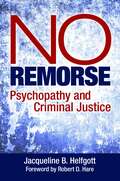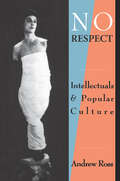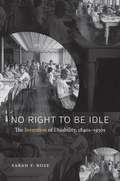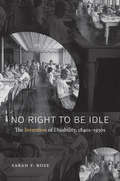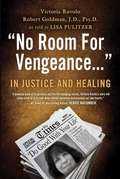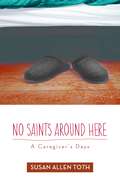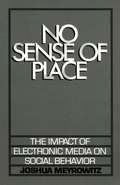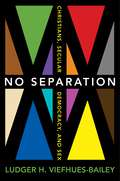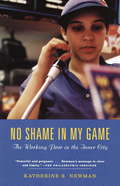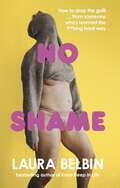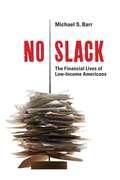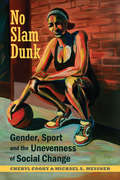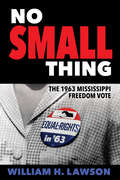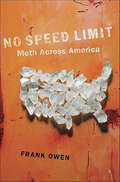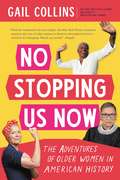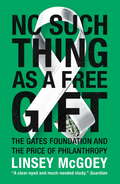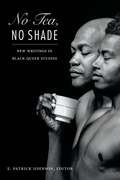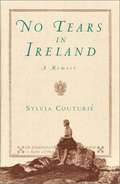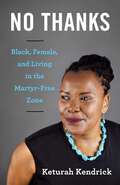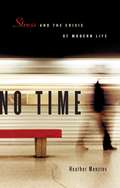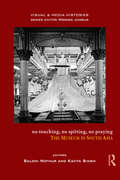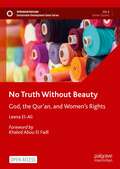- Table View
- List View
No Remorse: Psychopathy and Criminal Justice
by Jacqueline B. HelfgottPsychopathy and Criminal Justice provides a comprehensive examination of the empirical research and cultural understanding of psychopathy. The book examines ways in which the construct and concept of psychopathy have made their way into criminological theory and criminal justice practice.<p><p>It offers a focused look at how the term "psychopath" is used and understood in law enforcement, the courts, corrections, victim services, and juvenile justice. Additionally, it examines historical, research, and cultural perspectives on psychopathy for understanding criminal behavior, exploring theories of and research into psychopaths, psychopathy and gender, and representations of psychopaths in film and literature.
No Respect: Intellectuals and Popular Culture
by Andrew RossThe intellectual and the popular: Irving Howe and John Waters, Susan Sontag and Ethel Rosenberg, Dwight MacDonald and Bill Cosby, Amiri Baraka and Mick Jagger, Andrea Dworkin and Grace Jones, Andy Warhol and Lenny Bruce. All feature in Andrew Ross's lively history and critique of modern American culture. Andrew Ross examines how and why the cultural authority of modern intellectuals is bound up with the changing face of popular taste in America. He argues that the making of "taste" is hardly an aesthetic activity, but rather an exercise in cultural power, policing and carefully redefining social relations between classes.
No Right To Be Idle: The Invention Of Disability, 1850-1930
by Sarah F. Rose<P><P>During the late nineteenth and early twentieth centuries, Americans with all sorts of disabilities came to be labeled as "unproductive citizens." Before that, disabled people had contributed as they were able in homes, on farms, and in the wage labor market, reflecting the fact that Americans had long viewed productivity as a spectrum that varied by age, gender, and ability. But as Sarah F. Rose explains in No Right to Be Idle, a perfect storm of public policies, shifting family structures, and economic changes effectively barred workers with disabilities from mainstream workplaces and simultaneously cast disabled people as morally questionable dependents in need of permanent rehabilitation to achieve "self-care" and "self-support." <P><P> By tracing the experiences of policymakers, employers, reformers, and disabled people caught up in this epochal transition, Rose masterfully integrates disability history and labor history. She shows how people with disabilities lost access to paid work and the status of "worker--a shift that relegated them and their families to poverty and second-class economic and social citizenship. This has vast consequences for debates about disability, work, poverty, and welfare in the century to come.
No Right to Be Idle: The Invention of Disability, 1840s–1930s
by Sarah F. RoseDuring the late nineteenth and early twentieth centuries, Americans with all sorts of disabilities came to be labeled as "unproductive citizens." Before that, disabled people had contributed as they were able in homes, on farms, and in the wage labor market, reflecting the fact that Americans had long viewed productivity as a spectrum that varied by age, gender, and ability. But as Sarah F. Rose explains in No Right to Be Idle, a perfect storm of public policies, shifting family structures, and economic changes effectively barred workers with disabilities from mainstream workplaces and simultaneously cast disabled people as morally questionable dependents in need of permanent rehabilitation to achieve "self-care" and "self-support." By tracing the experiences of policymakers, employers, reformers, and disabled people caught up in this epochal transition, Rose masterfully integrates disability history and labor history. She shows how people with disabilities lost access to paid work and the status of "worker--a shift that relegated them and their families to poverty and second-class economic and social citizenship. This has vast consequences for debates about disability, work, poverty, and welfare in the century to come.
No Room for Vengeance: In Justice and Healing
by Robert Goldman Lisa Pulitzer Victoria RuvoloA true story of a teenage prank gone wrong, the woman whose life it nearly took, and what can happen when justice and forgiveness step ahead of the need for vengeance. Holiday season 2004. A snowy night. Two friends driving home from a family event. Teenagers on a joy ride, out for a night of mischief. And an incident that makes front page news in New York and beyond.
No Saints around Here: A Caregiver’s Days
by Susan Allen TothWhen we promise &“in sickness and in health,&” it may be a mercy that we don&’t know exactly what lies ahead. Forcing food on an increasingly recalcitrant spouse. Brushing his teeth. Watching someone you love more than ever slip away day by day. As her husband James&’s Parkinson&’s disease with eventual dementia began to progress, writer Susan Allen Toth decides she intensely wants to keep her husband at home—the home he designed and loved and lived in for a quarter century—until the end.No saint, as she often reminds the reader, Toth found solace in documenting her days as a caregiver. The result, written in brief, episodic bursts during the final eighteen months of James&’s life, has a rare and poignant immediacy. Wrenching, occasionally peevish, at times darkly funny, and always deeply felt, Toth&’s intimate, unsparing account reflects the realities of seeing a loved one out of life: the critical support of some friends and the disappearance of others; the elasticity of time, infinitely slow and yet in such short supply; the sheer physicality of James&’s decline and the author&’s own loneliness; the practical challenges—the right food, the right wheelchair, the right hospital bed—all intricately interlocking parts of the act of loving and caring for someone who in so many ways is fading away.&“We all need someone to hear us,&” Toth says of the millions who devote their days to the care of a loved one. Her memoir is at once an eloquent expression of that need and an opening for others. No Saints around Here is the beginning of a conversation in which so many of us may someday find our voices.
No Second Chance
by Human Rights WatchDecent and stable housing is essential for human survival and dignity, a principle affirmed both in U.S. policy and international human rights law. The United States provides federally subsidized housing to millions of low-income people who could not otherwise afford homes on their own. U.S. policies, however, exclude countless needy people with criminal records, condemning them to homelessness or transient living. Exclusions based on criminal records ostensibly protect existing tenants. There is no doubt that some prior offenders still pose a risk and may be unsuitable neighbors in many of the presently-available public housing facilities. But U.S. housing policies are so arbitrary, overbroad, and unnecessarily harsh that they exclude even people who have turned their lives around and remain law-abiding, as well as others who may never have presented any risk in the first place.
No Sense of Place: The Impact of Electronic Media on Social Behavior
by Joshua MeyrowitzHow have changes in media affected our everyday experience, behavior, and sense of identity? Such questions have generated endless arguments and speculations, but no thinker has addressed the issue with such force and originality as Joshua Meyrowitz in No Sense of Place. Advancing a daring and sophisticated theory, Meyrowitz shows how television and other electronic media have created new social situations that are no longer shaped by where we are or who is "with" us. While other media experts have limited the debate to message content, Meyrowitz focuses on the ways in which changes in media rearrange "who knows what about whom" and "who knows what compared to whom," making it impossible for us to behave with each other in traditional ways. No Sense of Place explains how the electronic landscape has encouraged the development of: -More adultlike children and more childlike adults; -More career-oriented women and more family-oriented men; and -Leaders who try to act more like the "person next door" and real neighbors who want to have a greater say in local, national, and international affairs. The dramatic changes fostered by electronic media, notes Meyrowitz, are neither entirely good nor entirely bad. In some ways, we are returning to older, pre-literate forms of social behavior, becoming "hunters and gatherers of an information age." In other ways, we are rushing forward into a new social world. New media have helped to liberate many people from restrictive, place-defined roles, but the resulting heightened expectations have also led to new social tensions and frustrations. Once taken-for-granted behaviors are now subject to constant debate and negotiation. The book richly explicates the quadruple pun in its title: Changes in media transform how we sense information and how we make sense of our physical and social places in the world.
No Separation: Christians, Secular Democracy, and Sex
by Ludger H. Viefhues-BaileyThrough a potent mix of authoritarianism, heterosexism, xenophobia, and ethnoracial nationalism, powerful illiberal Christian movements have upended liberal democracies in countries that were once seen as paradigms of secular governance. Ludger H. Viefhues-Bailey offers new insight into the foundations of these movements, demonstrating how they emerge from the contradictions at the intersection of secularism and democracy.No Separation examines recent conflicts that link national identity, religion, and sexuality: debates over Muslim veiling practices in Germany, same-sex marriage in France, and migration and abortion in the United States. In each case, illiberal Christianities portray popular sovereignty as threatened at the same time as they display an obsessive concern with the politics of sex and reproduction. Underlying these conflicts, No Separation shows, is the fundamental tension of democracy—who belongs to “the People.” Viefhues-Bailey argues that when secularism and democracy meet, cultural religions appear, seeking control over women’s bodies, national borders, and the racialized reproduction of the People in defense of the ideal of popular sovereignty.Connecting political theology, political philosophy, and the sociology of religion with gender and sexuality studies, No Separation is a deeply original analysis of the crisis of democracy and the limits of secularism. It also suggests alternative ways of imagining the People, proposing a more humane vision of borders, sexualities, and social bonds.
No Shame in my Game: The Working Poor in the Inner City
by Katherine S. Newman"Powerful and poignant. . . . Newman's message is clear and timely. " --The Philadelphia Inquirer InNo Shame in My Game, Harvard anthropologist Katherine Newman gives voice to a population for whom work, family, and self-esteem are top priorities despite all the factors that make earning a living next to impossible--minimum wage, lack of child care and health care, and a desperate shortage of even low-paying jobs. By intimately following the lives of nearly 300 inner-city workers and job seekers for two yearsin Harlem, Newman explores a side of poverty often ignored by media and politicians--the working poor. The working poor find dignity in earning a paycheck and shunning the welfare system, arguing that even low-paying jobs give order to their lives. No Shame in My Gamegives voice to a misrepresented segment of today's society, and is sure to spark dialogue over the issues surrounding poverty, working and welfare.
No Shame: How to drop the guilt … from some who’s learned the f**king hard way
by Laura BelbinShame, shame we know your nameDo we own it? Being a woman that is. Do we fuck! We live in fear of how we look, what we eat, how we age and what we do. Wow, it's 2022 and we're still churning out that same old shit. I've been told as you get older you care less. Fucking great. I can't wait to be menopausal with skunk-like grey track lines in my hair, saggier tits, and miserable as shit. I don't know about you, but I'd quite like to have that experience - the no-fucks-experience that is - now, before that all happens. To have the confidence to believe in who I am. It's a push we all have to make - whether it be in our confidence over our bodies, who we are as people, or what goes on inside our mind - and we all have to work at it. It's baby steps. So let's take it back to those tiny steps, because all mountains that are climbed don't happen without practice, perseverance, self-belief and a fuck ton of work.
No Slack
by Michael S. BarrThe financial crisis exposed the potentially unsavory results of the interaction between low- and moderate income households and alternative and mainstream financial institutions. Many households were overleveraged or paid high costs for financial services, while others lacked access to useful financial products that can cushion against economic instability. The financial services system is not well designed to serve low- and moderate-income households, leaving them without financial slack: they did not have adequate breathing room for making the financial adjustments that would permit them to better meet their own needs. No Slack shows us why these families were the least prepared to handle the shock of the deep recession.This pivotal analysis focuses on the Detroit metropolitan area's low- and moderate-income neighborhoods, which are similar to those of other Rust Belt communities. The Detroit Area Household Financial Services study--conducted at the height of the subprime lending boom--examines these households' decisionmaking processes, behaviors, and attitudes toward a full range of financial transactions. No Slack reveals widespread problems in home mortgage lending, the common threads among people who file for bankruptcy, the reasons so many households are unbanked, and how behaviorally informed financial regulation can make the market work better. Drawing on his deep policy experience, Michael Barr advocates helping families seek financial stability in three primary ways: enhancing individuals' financial capability, using technology to promote access to financial products and services that meet their needs, and establishing strong protections for consumers.
No Slack
by Michael S. BarrThe financial crisis exposed the potentially unsavory results of the interaction between low- and moderate income households and alternative and mainstream financial institutions. Many households were overleveraged or paid high costs for financial services, while others lacked access to useful financial products that can cushion against economic instability. The financial services system is not well designed to serve low- and moderate-income households, leaving them without financial slack: they did not have adequate breathing room for making the financial adjustments that would permit them to better meet their own needs. No Slack shows us why these families were the least prepared to handle the shock of the deep recession.This pivotal analysis focuses on the Detroit metropolitan area's low- and moderate-income neighborhoods, which are similar to those of other Rust Belt communities. The Detroit Area Household Financial Services study-conducted at the height of the subprime lending boom-examines these households' decisionmaking processes, behaviors, and attitudes toward a full range of financial transactions. No Slack reveals widespread problems in home mortgage lending, the common threads among people who file for bankruptcy, the reasons so many households are unbanked, and how behaviorally informed financial regulation can make the market work better. Drawing on his deep policy experience, Michael Barr advocates helping families seek financial stability in three primary ways: enhancing individuals' financial capability, using technology to promote access to financial products and services that meet their needs, and establishing strong protections for consumers.
No Slam Dunk: Gender, Sport and the Unevenness of Social Change (Critical Issues in Sport and Society)
by Faye Linda Wachs Michela Musto Lauren Rauscher Don Sabo Cheryl Cooky Professor Michael A. Messner Shari Dworkin Marko Begovic Carole Oglesby Marjorie Snyder Suzel Bozada-Deas Ranissa DycusIn just a few decades, sport has undergone a radical gender transformation. However, Cheryl Cooky and Michael A. Messner suggest that the progress toward gender equity in sports is far from complete. The continuing barriers to full and equal participation for young people, the far lower pay for most elite-level women athletes, and the continuing dearth of fair and equal media coverage all underline how much still has yet to change before we see gender equality in sports. The chapters in No Slam Dunk show that is this not simply a story of an “unfinished revolution.” Rather, they contend, it is simplistic optimism to assume that we are currently nearing the conclusion of a story of linear progress that ends with a certain future of equality and justice. This book provides important theoretical and empirical insights into the contemporary world of sports to help explain the unevenness of social change and how, despite significant progress, gender equality in sports has been “No Slam Dunk.”
No Small Thing: The 1963 Mississippi Freedom Vote (Margaret Walker Alexander Series in African American Studies)
by William H. LawsonThe Mississippi Freedom Vote in 1963 consisted of an integrated citizens' campaign for civil rights. With candidates Aaron Henry, a black pharmacist from Clarksdale for governor, and Reverend Ed King, a college chaplain from Vicksburg for lieutenant governor, the Freedom Vote ran a platform aimed at obtaining votes, justice, jobs, and education for blacks in the Magnolia State.Through speeches, photographs, media coverage, and campaign materials, William H. Lawson examines the rhetoric and methods of the Mississippi Freedom Vote. Lawson looks at the vote itself rather than the already much-studied events surrounding it, an emphasis new in scholarship. Even though the actual campaign was carried out from October 13 to November 4, the Freedom Vote's impact far transcended those few weeks in the fall. Campaign manager Bob Moses rightly calls the Freedom Vote "one of the most unique voting campaigns in American history." Lawson demonstrates that the Freedom Vote remains a key moment in the history of civil rights in Mississippi, one that grew out of a rich tradition of protest and direct action.Though the campaign is overshadowed by other major events in the arc of the civil rights movement, Lawson regards the Mississippi Freedom Vote as an early and crucial exercise of citizenship in a lineage of racial protest during the 1960s. While more attention has been paid to the March on Washington and the protests in Birmingham or to the assassination of John F. Kennedy and the Freedom Summer murders, this book yields a long-overdue, in-depth analysis of this crucial movement.
No Speed Limit: Meth Across America
by Frank OwenHells Angels and fallen televangelist Ted Haggard. Cross-country truckers and suburban mothers. Trailer parks, gay sex clubs, college campuses, and military battlefields. In this fascinating book, Frank Owen traces the spread of methamphetamine—meth—from its origins as a cold and asthma remedy to the stimulant wiring every corner of American culture. Meth is the latest "epidemic" to attract the attention of law enforcement and the media, but like cocaine and heroin its roots are medicinal. It was first synthesized in the late nineteenth century and applied in treatment of a wide range of ailments; by the 1940s meth had become a wonder drug, used to treat depression, hyperactivity, obesity, epilepsy, and addictions to other drugs and alcohol. Allied, Nazi, and Japanese soldiers used it throughout World War II, and the returning waves of veterans drove demand for meth into the burgeoning postwar suburbs, where it became the "mother's helper" for a bored and lonely generation. But meth truly exploded in the 1960s and '70s, when biker gang cooks using burners, beakers, and plastic tubes brought their expertise from California to the Ozarks, the Southwest, and other remote rural areas where the drug could be manufactured in kitchen labs. Since then, meth has been the target of billions of dollars in federal, state, and local anti-drug wars. Murders, violent assaults, thefts, fires, premature births, and AIDS—rises in all of these have been blamed on the drug that crosses classes and subcultures like no other. Acclaimed journalist Frank Owen follows the users, cooks, dealers, and law enforcers to uncover a dramatic story being played out in cities, small towns, and farm communities across America. No Speed Limit is a panoramic, high-octane investigation by a journalist who knows firsthand the powerful highs and frightening lows of meth.
No Stone Unturned: The True Story of the World's Premier Forensic Investigators
by Steve JacksonThe New York Times bestselling author takes readers on &“a fascinating journey into the trenches of crime [investigation]&”—now revised and updated (Lowell Cauffiel, New York Times bestselling author).A body stuffed in a car trunk swallowed by the swirling, muddy waters of the Missouri River. A hiker brutally murdered, then thrown off a steep embankment in a remote mountain range. A devious killer who hid his wife&’s body under a thick cement patio. For investigators, the story is often the same: they know a murder took place, they may even know who did it; but without key evidence, or a body, pursuing a conviction is nearly impossible. That&’s when they call NecroSearch International, a brain trust of the nation&’s top scientists in a wide variety of fields, who along with law enforcement, use the latest technology and field techniques to locate clandestine graves and hidden secrets to solve &“unsolvable&” crimes. In No Stone Unturned, Steve Jackson—who became a member of NecroSearch International in 2015—gives a captivating, insider&’s look into a realm of crime investigation of which few people are aware. &“The book covers the group&’s quirky beginnings and digs into its most important cases suspensefully; Jackson&’s sharp eye misses nothing in the painstakingly rendered details. A must-have for true crime fans, it should also be of great interest to anyone fascinated with the practical applications of science.&”—Publishers Weekly (starred review)&“Delves into cases that would make good novels, but they&’re real. Furthermore, he describes a group of uncommon people performing uncommon tasks, and he does it with respect, accuracy and genuine style.&”—Ron Franscell, bestselling author of Alice & Gerald: A Homicidal Love Story
No Stopping Us Now: The Adventures of Older Women in American History
by Gail CollinsA lively, fascinating, eye-opening look at women and aging in America, by the beloved New York Times columnist."You're not getting older, you're getting better," or so promised the famous 1970's ad--for women's hair dye. Americans have always had a complicated relationship with aging: embrace it, deny it, defer it--and women have been on the front lines of the battle, willingly or not. In her lively social history of American women and aging, acclaimed New York Times columnist Gail Collins illustrates the ways in which age is an arbitrary concept that has swung back and forth over the centuries. From Plymouth Rock (when a woman was considered marriageable if "civil and under fifty years of age"), to a few generations later, when they were quietly retired to elderdom once they had passed the optimum age for reproduction, to recent decades when freedom from striving in the workplace and caretaking at home is often celebrated, to the first female nominee for president, American attitudes towards age have been a moving target. Gail Collins gives women reason to expect the best of their golden years.
No Such Thing as a Free Gift
by Linsey McgoeyPhilanthro-capitalism: How charity became big businessThe charitable sector is one of the fastest-growing industries in the global economy. Nearly half of the more than 85,000 private foundations in the United States have come into being since the year 2000. Just under 5,000 more were established in 2011 alone. This deluge of philanthropy has helped create a world where billionaires wield more power over education policy, global agriculture, and global health than ever before.Charities link the farmers in Africa to the boardrooms of corporate foundations and the corridors of the World Economic Forum at Davos. Far from being selfless, plutocratic philanthropy may be the ultimate profit-making tool.In No Such Thing as a Free Gift, author and academic Linsey McGoey puts this new golden age of philanthropy under the microscope--paying particular attention to the Bill and Melinda Gates Foundation. As large charitable organizations replace governments as the providers of social welfare, their largesse becomes suspect. The businesses fronting the money often create the very economic instability and inequality the foundations are purported to solve. We are entering an age when the ideals of social justice are dependent on the strained rectitude and questionable generosity of the mega-rich.From the Hardcover edition.
No Tea, No Shade: New Writings in Black Queer Studies
by E. Patrick JohnsonThe follow-up to the groundbreaking Black Queer Studies, the edited collection No Tea, No Shade brings together nineteen essays from the next generation of scholars, activists, and community leaders doing work on black gender and sexuality. Building on the foundations laid by the earlier volume, this collection's contributors speak new truths about the black queer experience while exemplifying the codification of black queer studies as a rigorous and important field of study. Topics include "raw" sex, pornography, the carceral state, gentrification, gender nonconformity, social media, the relationship between black feminist studies and black trans studies, the black queer experience throughout the black diaspora, and queer music, film, dance, and theater. The contributors both disprove naysayers who believed black queer studies to be a passing trend and respond to critiques of the field's early U.S. bias. Deferring to the past while pointing to the future, No Tea, No Shade pushes black queer studies in new and exciting directions.Contributors. Jafari S. Allen, Marlon M. Bailey, Zachary Shane Kalish Blair, La Marr Jurelle Bruce, Cathy J. Cohen, Jennifer DeClue, Treva Ellison, Lyndon K. Gill, Kai M. Green, Alexis Pauline Gumbs, Kwame Holmes, E. Patrick Johnson, Shaka McGlotten, Amber Jamilla Musser, Alison Reed, Ramón H. Rivera-Servera, Tanya Saunders, C. Riley Snorton, Kaila Story, Omise'eke Natasha Tinsley, Julia Roxanne Wallace, Kortney Ziegler
No Tears In Ireland: A Memoir
by Sylvia CouturiéOn a cool, end-of-July morning in 1939, eleven year-old Sylvia Couturie and her eight-year-old sister, Marguerite, escorted by their Irish nanny, "Wally," left their family's elegant French chateau for a fantastically ill-timed vacation. Expecting their parents to join them in a month, they embarked in high spirits on this rare adventure outside their privileged but tightly confined orbit of horses and hunts, servants and boarding schools. They sensed the distant rumblings of trouble on the edges of their world, but it would have been inconceivable that their long-awaited holiday would become a prolonged imprisonment, that their difficult governess would become their tyrannical jailer. It would defy belief to think that these daughters of privilege would soon be forced to fight for survival in a strange land as the world descended into war, with only the indomitable spirit of a little girl to carry them through. Cut off from their family as France falls to the Germans, the penniless threesome is reduced to living in a miserable cottage without indoor plumbing on a remote strip of the Irish coast. As the months turn into years, Sylvia becomes aware that Wally is more concerned with preserving her status as their guardian than with securing their welfare and is slipping into dementia. Denied any meaningful education and cut off by Wally from all but the most fleeting human contact, the girls endure, saved only by Sylvia's extraordinary resourcefulness and the occasional kindness of strangers. Kept from home by Hitler's invaders, they are shocked and wounded by the pro-German sentiments of the anti-British locals. As they strain to make sense of their new and unrecognizable reality and are forced to deal with complex issues of bigotry and adult lunacy, the simplified yet profoundly astute worldview of the child is brilliantly conveyed. As German bombers fleeing British fighters during the battle of Britain terrorize the cowering threesome by dropping unused bombs in the ocean near their cottage, Sylvia finds strength in Churchill's voice on the BBC and promises him not to cry until victory is won, her touchingly unique contribution to the war effort. The painstaking wait for word from home, the daily trials of survival, and the crushing loneliness of childhood are evoked with devastating simplicity. Reconstructed from Couturie's surviving childhood diary, this unforgettable narrative of the resilience of children chronicles her desperate fight for something approaching normalcy. In the process, she delivers an indelible portrait of an obscure corner of the earth, remote from the historic events of the day and yet the starkly beautiful backdrop for the often overlooked story of powerless children on the outer edges of a world gone mad. This is the heartbreaking memoir of a childhood interrupted, of a way of life lost and a new one found, of exile and homecoming in a world restored to peace but forever changed. Sylvia Couturie grew up in France and Ireland. She has lived in New York, where two of her three sons were born, and in Vietnam, where she was "the voice of France in the Far East" on Radio Saigon, She lives in Paris and at Le Mesnil, her country home.
No Thanks: Black, Female, and Living in the Martyr-Free Zone
by Keturah KendrickThrough eight humorous essays, Keturah Kendrick chronicles her journey to freedom. She shares the stories of other women who have freed themselves from the narrow definition of what makes a &“proper woman.&” Spotlighting the cultural bullying that dictates women must become mothers to the expectation that one&’s spiritual path follow the traditions of previous generations, Kendrick imagines a world where black women make life choices that center on their needs and desires. She also examines the rising trend of women choosing to remain single and explores how such a choice is the antithesis to the trope of the sorrowful black woman who cannot find a man to grant her the prize of legal partnership. A mixture of memoir and cultural critique, No Thanks uses wit and insight to paint a picture of the twenty-first-century black woman who has unchained herself from what she is supposed to be. A black woman who has given herself permission to be whomever she wants to be.
No Time
by Heather MenziesThese days, we all have too much to do and too little time. This book is about how technology has changed our lives and what we can do about it.What happened to the promise that technology would give us more leisure time? Instead, we are working harder and for longer hours than we did fifteen years ago, squeezed and scattered and stressed to the point of burnout. We are trying to cope with a constantly accelerating pace brought about by cutbacks and restructuring, but also by computers and cell phones that, in their super-efficient dispatch of data, text and voice messages and the like, let us do more things faster than ever before.Yet somewhere between the multi-tasking pace and the sea of data divorced from real life, we're losing touch with ourselves and with each other. We're even losing a sense of how to tell when things go wrong and how to take action when they do. We need to take back our lives, and renew the humanity of our social institutions.
No Touching, No Spitting, No Praying: The Museum in South Asia (Visual And Media Histories Ser.)
by Kavita Singh Saloni MathurThis volume brings together a range of essays that offer a new perspective on the dynamic history of the museum as a cultural institution in South Asia. It traces the museum from its origin as a tool of colonialism and adoption as a vehicle of sovereignty in the nationalist period, till its role in the present, as it reflects the fissured identities of the post-colonial period.
No Truth Without Beauty: God, the Qur’an, and Women's Rights (Sustainable Development Goals Series)
by Leena El-AliIn this comprehensive open access book, written for readers from any or no religious background, Leena El-Ali does something remarkable. Never before has anyone taken on every last claim relating to Islam and women and countered it not just with Qur’anic evidence to the contrary, but with easy-to-use tools available to all. How can a woman’s testimony be worth half of a man’s? How can men divorce their wives unilaterally by uttering three words? And what’s with the obsession with virgins in Paradise? Find the chapter on any of the seventeen topics in this book, and you will quickly learn a) where the myth came from and b) how to bust it. The methodology pursued is simple. First, the Qur’an is given priority over all other literary or “scriptural” sources. Second, the meaning of its verses in the original Arabic is highlighted, in contrast to English translations and/or widespread misunderstanding or misinterpretation.
